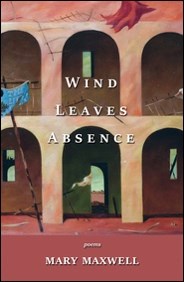By Mary Maxwell
Published by Thistledown Press
$17.95 ISBN 978-1-77187-100-6
I read Saskatoon poet (and nurse) Mary Maxwell’s first book, Wind Leaves Absence, with interest and no small amount of admiration. Many first books of what’s often called confessional poetry — I prefer the word intimate — are a compendium of high\low events experienced over the writer’s lifetime, and what results is a wildly disparate package. While diversity can make for a lively read, we often see more seasoned writers tackle exclusive subjects, examining from multiple angles and probing more deeply to illuminate, better understand and process. Maxwell daringly takes on the landscape of grief, specifically the pain experienced upon the deaths of her father, two brothers (who died in car accidents two years apart), friends and patients. Religion – in particular the Catholicism she grew up with and appears to wrestle with (“miserable prayers”) – is also front and centre in this collection.
In the first few poems the writer establishes mood with phrases that emotionally thrum, like bells in a deserted monastery: “the wilderness between words,” “Trousers fall from hangers\collapse on the floor,” and “Pushing his walker through wet matted leaves.” She does a spot on job of portraying the hopelessness of dementia. Her father must navigate “the daily maze of the kitchen.”
I found two memory-loss poems particularly moving. In “Line on Paper,” when her father tries to draw a beloved horse, Sandy, he manages the initial line to indicate the horse’s neck, then “He puts the pencil down, looks at me\doesn’t know\what the next line should be”. In the five-line poem “Birthday,” he is signing a card for his wife and pauses because he “ [doesn’t] remember how to spell wonderful ”. This is powerful because it objectively shows her father’s decline. I expect that Maxwell’s nursing background–those in the medical field cannot dwell on the inevitable losses–has had a positive influence on her poetry: there’s no melodrama here. This is just the way it is. But sometimes the medical frankness is rattling, ie: in “Old Man’s Friend,” after the poet’s father chokes and is admitted to hospital, the presiding doctor declares that pneumonia will move in. He “closes the chart,” and says “ ‘ We call it the old man’s friend’”.
These mostly quiet poems often reveal life’s disquieting ironies, ie: funeral orchids have “choked\fallen over\gone dry” while in another room “birthday flowers\loudly proclaim spring”. After a night of summer joy-riding a friend’s daughter remains unresponsive in hospital. When the poet walks home from this scene, “Cars roar past, music\blaring, girls laughing”. In “Sweet Old Lady,” the author\nurse finds a diabetic woman’s apartment filled with candy while her feet have “gone black,” the “sweetness eating [her] alive”.
Maxwell does not obscure the raw realities of death, nor does she makes saints of her dead. In a poem titled “Fool,” she writes “I’m standing in line at The Bay to buy\a pair of pants for my brother’s corpse”. She shows us that just as winter “falters into spring,” so must we move on after unfathomable grief, and writing it all out is good medicine.
This book is available at your local bookstore or from www.skbooks.com.




